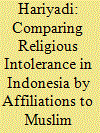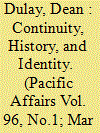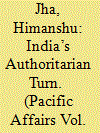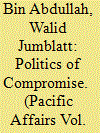|
|
|
Sort Order |
|
|
|
Items / Page
|
|
|
|
|
|
|
| Srl | Item |
| 1 |
ID:
189555


|
|
|
|
|
| Summary/Abstract |
Very few studies explicitly, let alone quantitatively, examine gaps in religious intolerance among individual Muslims based on affiliation with major Muslim organizations in Indonesia. Most existing studies either focus on a single organization (non-comparative), are at the organizational policy level (not examining individual attitudes), or use a limited number of samples in their analysis. Against this backdrop, this study compares Indonesian Muslims’ levels of religious intolerance based on their affiliation with Muslim organizations or traditions: Nahdlatul Ulama (NU), Muhammadiyah, and other organizations. We utilize a large-scale household survey, the 2014 Indonesia Family Life Survey-5, and run an ordinal logistic regression to identify organizations’ rank on the religious intolerance scale. We find that Muslims without any affiliation with a Muslim organization (some 18 percent of Indonesian Muslims) are the most tolerant. Against this reference group, we find that NU followers are generally the most tolerant, followed by those affiliated with Muhammadiyah, and those affiliated with other Muslim organizations. This finding adds a stock of knowledge to our understanding of religion and society, especially regarding interfaith relations in Indonesia and in the Muslim world in general. Methodologically, this study also shows the benefit and feasibility of identifying the dynamic of religious intolerance using a quantitative approach at a micro level.
|
|
|
|
|
|
|
|
|
|
|
|
|
|
|
|
| 2 |
ID:
189558


|
|
|
|
|
| Summary/Abstract |
In May of 2022, Bongbong Marcos won a commanding 59 percent of the vote to become president of the Philippines. His victory was, on some level, shocking to scholars and analysts of Philippine politics. As a result, a plethora of different theories have been proposed, in an attempt to explain why Marcos won. In this paper, we use nationally representative survey data to explore which factors predict (and do not predict) voting intention for Marcos. We find that, a) support for former President Rodrigo Duterte, b) positive perceptions of the late President Ferdinand Marcos and martial law, and c) ethnic (linguistic) identity are strong predictors of voting for Bongbong Marcos. On the other hand, age, education, and income are not. Consequently, theories based on continuity, coalition, history, and identity provide the most leverage on the question of why Bongbong Marcos won the election.
|
|
|
|
|
|
|
|
|
|
|
|
|
|
|
|
| 3 |
ID:
189557


|
|
|
|
|
| Summary/Abstract |
This article examines the redress campaign waged by activists in Japan on behalf of roughly 2,000 North Korean A-bomb victims (pipokja). These victims were repatriated from Japan after being subjected to the 1945 US nuclear attacks on Hiroshima and Nagasaki, while under colonial rule. From the early 1990s through to the twenty-first century, activists in Japan pursued redress for these A-bomb survivors in close synchronicity with the redress movements centred on South Korean victims. Highlighting the potential of the individual as entrepreneur within collective action settings, the redress developments were initiated and largely driven by an activist, Lee Sil-gun (1929–2020).
Although Tokyo and Pyongyang were initially reluctant to acknowledge that A-bomb survivors existed in North Korea, in the face of sustained pressure by the Japan-based activists, the two governments facilitated a limited redress process for the victims by making various concessions on the issue. How did these activists navigate the structural constraints of the authoritarian North Korean state and the volatile bilateral relationship in enacting their transnational activism? How were they able to elicit concessions on their redress objectives from Tokyo and Pyongyang in the absence of formalized diplomatic relations? Drawing on fieldwork conducted in Japan and South Korea, this article probes these questions by empirically tracing and analyzing the evolution of the redress campaign for the North Korean A-bomb victims. I utilize the concept of polylateral diplomacy to elucidate the dynamic of engagement between the activists and the two governments.
|
|
|
|
|
|
|
|
|
|
|
|
|
|
|
|
| 4 |
ID:
189560


|
|
|
| 5 |
ID:
189556


|
|
|
|
|
| Summary/Abstract |
This study explores the origins of pervasive elderly poverty in South Korea, which persists despite the continuous expansion of welfare programs and the consolidation of popular democracy in the country. Predicated upon the historical-institutional details of the development of welfare programs, this article examines and elucidates how the instrumentalization of welfare policy-making since the onset of state-led industrialization and the progress of electoral democracy since the democratic transition have hindered the implementation of effective anti-poverty policies. It argues that the exponential politicization of welfare issues amid the demise of the agenda-setting and implementation capacity of the welfare bureaucracy has resulted in a political preference for low-benefit, quasi-universal solutions without an increase in taxes or contributions, which has crowded out the policy option of imposing sufficiently generous measures targeted at this vulnerable segment of society. As pervasive elderly poverty persists, old-age welfare has been substantially privatized and dualized, compelling seniors to find market-based alternatives or to work in low-paying precarious labour sectors. Consequently, trust in South Korea’s public welfare system has declined, impeding the formation of pro-welfare solidarity despite the overall growth of the universalist welfare system and popular democracy.
|
|
|
|
|
|
|
|
|
|
|
|
|
|
|
|
| 6 |
ID:
189559


|
|
|
|
|
| Summary/Abstract |
This article discusses the repeal of Singapore’s Section 377A, the anti-gay sex law, which was announced by Prime Minister (PM) Lee Hsien Loong during the 2022 National Day Rally. I contend that the declaration by PM Lee demonstrates the possibilities and limits of advocacy coalition-building in Singapore. Utilizing the concept of calibrated social liberalization, I postulate that the repeal of Section 377A was the government’s response to shifting societal attitudes and years of strategic and adroit advocacy coalitionbuilding. However, predicated upon this success is that LGBT issues are not critical to the People’s Action Party’s (PAP) legitimacy, which is why it is willing to allow for contestations in this sphere. The PAP engages in social liberalization, without significant political liberalization; even then, the cultural liberalization is not absolute, as the government attempts to strike a political-electoral compromise with conservatives. Ultimately, calibrated social liberalization occurs in areas where there is significant public support, and on issues regarding which the government has no clear ideological predispositions.
|
|
|
|
|
|
|
|
|
|
|
|
|
|
|
|
|
|
|
|
|